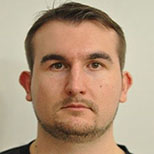
Sebastjan Nemec, MSc
EDUCATION
- 2012 – 2018 – Faculty of Pharmacy, University of Ljubljana (MSc)
- 2018 – Masters degree at Faculty of Pharmacy, University of Ljubljana; supervisor Assist. Prof. Dr. Stane Pajk, M. Pharm.
- 2018 (on-going) – Doctoral interdisplinary programme Biomedicine on Faculty of Pharmacy, University of Ljubljana and Department for material synthesis, »Jožef Stefan« Institute; supervisor Assist. Prof. Dr. Slavko Kralj, M. Pharm.
ACADEMIC AND SCIENTIFIC POSITION
From 10/2018 – Young researcher (PhD student) at Department for material synthesis, »Jožef Stefan« Institute
EMPLOYMENT
From 10/2018 – Young researcher (PhD student), »Jožef Stefan« Institute
PUBLICATIONS
- One-pot method for preparation of magnetic multi-core nanocarriers for drug delivery, Materials 2019, 12 (3), 540
- Magnetic silica-coated iron oxide nanochains as photothermal agents, disrupting the extracellular matrix, and eradicating cancer cells, Cancers 2019, 11 (12), 2040
Research activities
During his study on the Faculty of pharmacy, University of Ljubljana he worked primarily in the field of organic syntheses. The main focusses were the synthesis development and optimisation with subsequent characterization of near-infrared fluorophores of the aza-bodipy scaffold and potential inhibitors of the mycolic InhA enzyme of the thiazole and thiadiazole classes. His master thesis was based on the synthesis and characterization of the newly synthesized InhA inhibitors.
As part of his on-going doctoral study on the Faculty of pharmacy and »Jožef Stefan« Institute he is currently conducting research as a member of the Research Program ARRS P2-0089-0106 financed by RSA. The main focus is the synthesis and processing of new, multifunctional materials containing (superpara)magnetic nanoparticles. These materials could be important as mediators for magnetic hyperthermia, magnetically-actuated soft matter manipulations, and for magnetic drug targeting. Although the synthesis of these materials in the form of nanoparticles is relatively well established, their functionalization and processing require further investigation and optimization.
